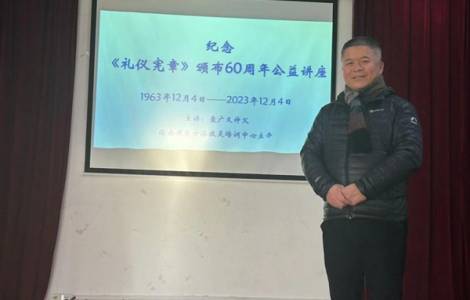
Jinan (Agenzia Fides) - The Franciscan Pastoral Center of the Diocese of Jinan, in the Chinese Province of Shandong, has just celebrated the 60th anniversary of the promulgation of the Conciliar Constitution on the Sacred Liturgy Sacrosanctum Concilium with a course organized ad hoc.
The document studied in the course organized by the Franciscan Pastoral Center of Jinan is one of the four conciliar constitutions resulting from the Second Vatican Council. It was adopted with 2158 votes in favor and only 19 against, and was solemnly promulgated by Pope Paul VI exactly 60 years ago, on December 4, 1963.
The initiative – according to local sources consulted by Fides - is part of a series of courses and meetings on the documents of the Second Vatican Council, aimed at renewing in the local Catholic community the importance of this key event in the history of Catholicism in contemporary times.
The Council Document dedicated to the Sacred Liturgy, the "culmination and source" of ecclesial life, has guided the liturgical renewal of recent decades, understood as a "return to the sources" and not as the experimentation of practices influenced by ephemeral fashions.
During the course, Father Yuan Guangyi, director of the Center, graduated in liturgical studies from the Faculty of Theology of the University of Strasbourg (France) and long involved in promoting the application of conciliar liturgical reform in communities of the Chinese Catholic Church, explained to around fifty parish representatives the history of the Council and the sources of the conciliar reform, "a milestone in the history of Catholicism in modern times". Regarding Sacrosanctum Concilium, the priest emphasized that one of the inspirational factors of the document was the intention to "bring Sacred Scripture back to the center of liturgical action and the life of the Church", by preserving the elementary and essential factors which "cannot be altered, because they were instituted by the Lord" and by freeing the liturgy from the encrustations and historical forms which had crystallized during the different historical eras.
In particular, Father Yuan analyzed the compatibility between the Council Document and the stages that Chinese Catholic communities are also called to take on the path of "sinicization", understood as a form of adaptation of ecclesial dynamics to the culture and administrative procedures in force in today's Chinese society. Sacrosanctum Concililum - explained among other things Father Yuan - "affirms that the liturgy of the Church, precisely to preserve and update the essential factors of liturgical action, can be modified over time". From this perspective, the "sinicization" required of communities of believers also aims to verify and attest the compatibility of liturgical forms in their content and their essential factors with "the traditional thought of the Chinese people". The criterion to keep in mind is that of "inclusiveness", a precious compass in China, "which is a multi-ethnic country where various beliefs take root and various cultures flourish". The The Council Document" added Father Yuan "indicates that even the guiding principles of liturgical action and the practices which govern the administration of the sacraments in the Church have adapted over time to the cultural and artistic sensitivities of the different peoples of the world". (NZ) (Agenzia Fides, 4/12/2023)